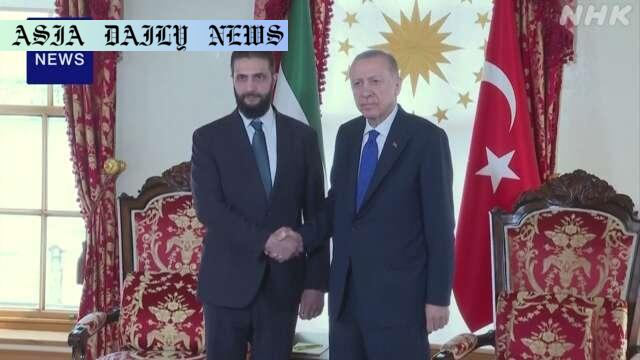Sanctions: Erdogan met Syria’s interim leader post-US action.
US eased sanctions on Syria, permitting specific transactions and investments.
Erdogan met Syria’s interim leader Ahmed al-Sharaa in Istanbul.
Turkey aims to strengthen economic engagement, especially in energy.
Syria’s interim government has emphasized ending the prolonged economic strain.

Introduction: The US Shift in Sanctions on Syria
The United States recently softened its stance on Syria, issuing a general license on activities that were previously prohibited under its sanctions policy. This move permits investments and transactions with Syria’s transitional government and has marked a significant turning point in international dynamics. The announcement came amidst ongoing discussions about rebuilding Syria’s economy, a task marred by a decade of internal conflict starting in 2011. This relief from sanctions reflects a nuanced policy shift that seeks to explore new opportunities without compromising broader geopolitical objectives.
Erdogan’s Strategic Meeting with Ahmed al-Sharaa
Closely following this development, Turkish President Recep Tayyip Erdogan met with Syria’s interim President Ahmed al-Sharaa in Istanbul. This meeting highlights a clear attempt by Turkey to reposition itself as a pivotal economic partner in Syria’s recovery process. Erdogan warmly welcomed the de facto Syrian leader and expressed a desire to increase collaboration, particularly in the field of energy. Given Turkey’s strategic location and its geopolitical ambitions, the strengthening of ties with Syria aligns with Erdogan’s larger pursuit of regional influence.
The Role of Oil and Energy in Bilateral Agreements
Turkey’s focus on energy cooperation with Syria is not an arbitrary decision. Syrian infrastructure, including its energy sector, has suffered immensely over the years due to the conflict. Rebuilding this sector could provide immense mutual benefits. For Turkey, access to Syrian energy resources can bolster its economic ambitions while creating a strategic interdependency that ensures political leverage. For Syria’s transitional government, external investments, especially in energy, are a critical pillar in the journey of economic stabilization.
The Economic Strains and Syria’s Rebuilding Efforts
Syria’s economy has been battered by years of internal strife, with sanctions only exacerbating the situation. Despite a semblance of political stability under the interim government, rebuilding infrastructure and reviving the local economy pose major challenges. The absence of international engagement has made reconstruction efforts slow and insufficient. Erdogan’s meeting with al-Sharaa signifies a renewed hope that economic collaboration could pave the way for faster recovery and inclusion in global commerce.
Conclusion: What Lies Ahead?
The interplay between US policies, Turkish involvement, and Syria’s efforts to recover creates a complex but opportunity-filled landscape. Erdogan’s proactive tie-up with Syria signals his aspiration to make Turkey an indispensable player in the region’s economic recovery dynamics. However, such engagements must move beyond symbolic meetings to establish pragmatic collaborations that tackle the realities of post-conflict rebuilding efforts. The role of external scrutiny and global support will be instrumental in driving a balanced, inclusive recovery for Syria.



Commentary
Erdogan’s Strategy to Strengthen Turkey’s Role
President Erdogan’s meeting with Ahmed al-Sharaa signals a pivotal moment not only in Syria’s recovery but also in Turkey’s position within the evolving geopolitics of the Middle East. In an era where economic influence increasingly shapes global politics, Erdogan’s decision to strengthen ties with Syria aligns with Turkey’s ambitions to be a key regional player. This meeting, following the US’s relaxation of sanctions, portrays Erdogan as an opportunistic leader capable of aligning Turkey’s economic and geopolitical interests seamlessly.
The Potential Benefits for Syria
Syria’s transitional government finds itself in a fragile yet hopeful position. Years of economic turmoil, coupled with crippling sanctions, have left its infrastructure in dire need of outside assistance. By engaging with Turkey, Syria stands to gain from enhanced trade ties, investments in energy, and economic revitalization. Such collaborations can set a precedent for other nations to step forward and support Syria without undermining international diplomatic interests. However, the road to recovery will not be easy and requires careful navigation through internal and external challenges.
Challenges and Broader Implications
The meeting also highlights the underlying challenges of fostering such collaborations. Turkey’s engagement with Syria might draw criticism or skepticism from other regional and global powers. Balancing these relations while ensuring mutual benefits will require both nations to tread carefully. Moreover, while economic collaborations can create avenues for progress, they cannot alone address the deeper social and infrastructural issues stemming from years of conflict. Global support, parallel to Turkey’s initiatives, will be necessary to ensure a holistic recovery for Syria.
The Path Forward
As this partnership develops, it will be crucial to monitor its tangible outcomes. Renewed hope often accompanies such high-profile meetings, but translating aspirations into on-the-ground results needs sustained effort. Syria’s rebuilding process demands not just economic interventions but also a long-term commitment to peace-building, social equity, and inclusion. Turkey’s involvement, while promising, is only one piece of a larger puzzle to bring stability and growth to the region. As these efforts progress, the global community will need to assess and adapt its role to ensure a balanced and fair recovery for all stakeholders.